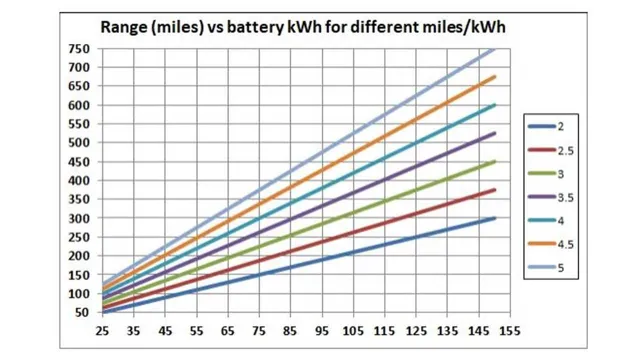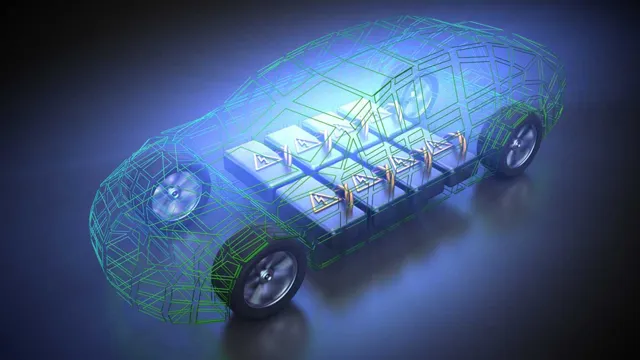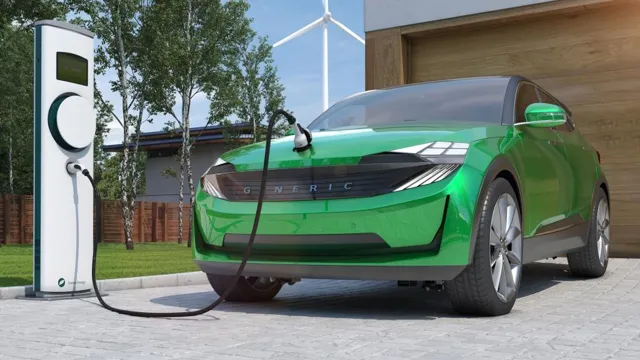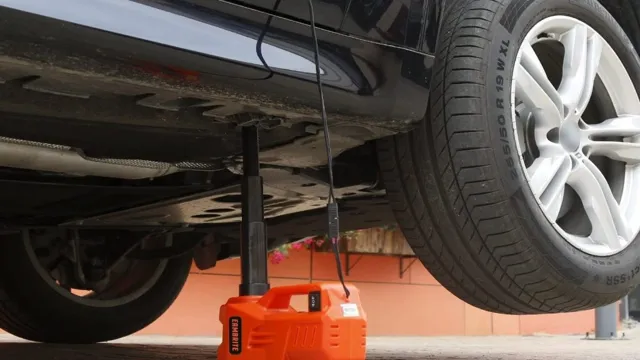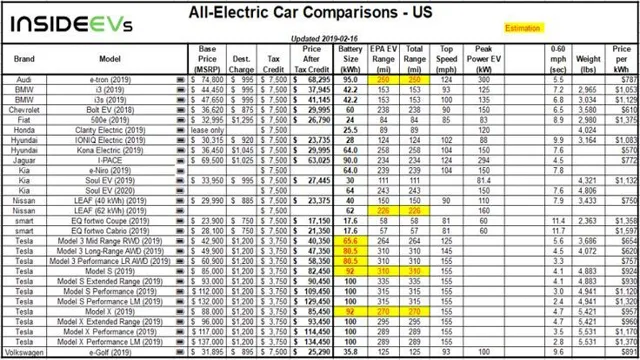Breaking Down Electric Car Battery Size: The Ultimate Guide to kWh and Range
Electric cars have taken the automotive industry by storm, offering a cleaner, quieter, and more efficient mode of transportation. One of the most crucial components of an electric car is its battery, which stores and provides energy to the vehicle’s electric motor. The size of an electric car battery is measured in kWh (kilowatt-hours) and plays a significant role in determining a car’s driving range and overall performance.
But what does kWh mean, and how does it affect an electric car? Essentially, kWh measures the amount of energy a battery can store and supply to the electric motor. The higher the battery size, the more energy it can store, resulting in a longer driving range and better performance. For instance, a small electric car may have a battery size of 30 kWh and a range of 100 miles, while a larger model might have a battery size of 100 kWh and a range of 350 miles or more.
Moreover, the battery size can influence the charging time of an electric car. A larger battery size will typically take longer to charge, while smaller batteries can charge relatively quickly. It’s worth noting that the battery size and range are not the only factors that determine an electric car’s performance.
Other elements such as the electric motor, weight, and aerodynamics can impact a car’s efficiency and performance. As more automakers continue to develop and improve their electric cars, the battery size and performance are expected to increase. The growing popularity of electric cars is driving innovation towards creating more efficient and sustainable vehicles.
The use of electric cars is becoming increasingly vital in reducing our carbon footprint and protecting the environment. With battery technology continually advancing, the future of electric cars looks incredibly bright.
Overview of Electric Car Batteries
Electric car battery size is measured in kilowatt-hours (kWh), which refers to the amount of energy a battery can store. The larger the battery, the longer the car can travel on a single charge. Electric cars typically have batteries ranging from around 30 kWh to over 100 kWh.
For example, the Nissan Leaf has a 40 kWh battery, while the Tesla Model S can come with a 100 kWh battery. However, the actual range of an electric car also depends on factors such as driving style, terrain, and weather conditions. It’s important to note that larger batteries also mean longer charging times and higher costs.
Some manufacturers offer different battery options for their models, allowing customers to choose the range that best suits their needs. As technology advances, we can expect to see even larger batteries with even longer ranges become more common in the electric car market.
How Electric Car Batteries Work
Electric car batteries are the heart of an electric vehicle, and they work quite differently than the batteries you use in your everyday life. Electric car batteries are made up of small, individual battery cells that are linked together to form a larger battery pack. These battery cells are usually lithium-ion, which are lightweight and efficient.
The voltage of the battery pack depends on the number of cells in the pack. These battery cells convert stored chemical energy into electrical energy, which powers the electric motor in an electric vehicle. Unlike gasoline cars, which rely on a combustion engine, electric cars use the stored energy in the battery to power an electric motor, which turns the wheels.
The good thing about electric cars is that their batteries can be recharged, ensuring that you can continue to use your electric vehicle for a long time. Electric car batteries provide a much cleaner and safer alternative to traditional gasoline cars. Thanks to advancements in technology and the use of lightweight materials, we can expect to see even better electric car batteries in the future.
Benefits of an Electric Car Battery
Electric Car Battery Electric car batteries are a crucial component of electric vehicles. They store the electrical energy that powers the electric motor and provide a range of benefits compared to traditional gasoline-powered cars. These batteries are known for their high efficiency and environmental friendliness, as they produce no tailpipe emissions.
Additionally, electric car batteries can be charged using renewable energy sources, reducing dependency on fossil fuels and lowering carbon footprints. Another key advantage of electric car batteries is their low maintenance needs, as they require minimal servicing and last longer than traditional car batteries. Although the initial cost of an electric car battery may be high, they offer more long-term savings compared to gasoline-powered cars due to their lower operating cost.
Despite challenges such as limited range and charging infrastructure, the advancements in battery technology are promising, making electric vehicles a viable and sustainable option for the future.
Average Electric Car Battery Size in kWh
When it comes to electric cars, battery size is a crucial aspect to consider as it directly impacts the vehicle’s driving range. The average electric car battery size in kWh varies depending on the make and model, but most EV battery packs fall somewhere between 30 and 100 kWh. For example, the Tesla Model S has a battery size range between 75-100 kWh, while the Nissan Leaf typically has a battery size range of 40-62 kWh.
Interestingly, the battery size of electric cars is expected to increase in the near future with the development of more powerful and efficient batteries. Ultimately, the size of an electric car battery plays a crucial role in determining the driving range and performance of an electric vehicle, making battery technology a significant area of development and advancement in the world of EVs.
Data on Popular Electric Car Models
If you’re thinking about buying an electric vehicle but are concerned about range anxiety, one of the key factors to consider is the size of the battery. The larger the battery, the further you’ll be able to travel on a single charge. So what is the average electric car battery size in kilowatt-hours (kWh)? According to recent data, the average battery size across popular electric car models is around 60 kWh.
However, this figure can vary significantly depending on the make and model. For example, the Tesla Model S has a 100 kWh battery, while the popular Nissan Leaf comes with a comparatively modest 40 kWh battery. It’s worth noting that battery size isn’t everything when it comes to range, and factors like driving conditions, speed, and temperature can also affect how far you can go on a single charge.
Ultimately, it’s important to consider your own driving habits and needs when choosing an electric car, as there’s no one-size-fits-all solution.
Comparison of Electric Car Battery Sizes
When it comes to electric cars, one important aspect to consider is the battery size. The average electric car battery size is measured in kilowatt-hour or kWh, and it can greatly impact the car’s performance, range, and cost. Generally, the larger the battery, the longer the driving range and the greater the cost.
For example, the Tesla Model S with a 100 kWh battery can travel up to 373 miles on a single charge, while the Nissan Leaf with a 40 kWh battery can go up to 149 miles. Other factors such as the vehicle’s weight and efficiency, as well as driving conditions, can also affect the battery performance. It is vital to pick an electric car with a battery size that meets your driving needs, whether it is for daily commutes or long road trips.
Factors That Affect Battery Size
The battery size of an electric car is an essential component to consider when selecting a vehicle. Many factors impact the size of an electric car battery, including the range you want to achieve, the size of the car, and your driving style. On average, the electric car battery size is measured in kilowatt-hours (kWh), and they range from about 30 kWh to 100 kWh.
The battery size typically correlates with the range of the car. For instance, if you’re looking for a car with a range of 150 miles, you’ll need a battery with a minimum of 30 kWh. If you’re looking for a car with a range of 300 miles, you’ll need a battery with at least 60 kWh.
It’s important to consider your driving style since long-distance driving and highway speeds can drain the battery more quickly. Installing efficient driving techniques such as braking gently and accelerating slowly can help preserve battery life. In summary, determining the electric car battery size you need depends on various factors, including your driving needs and lifestyle.
How to Choose the Right Electric Car Battery Size
Choosing the right electric car battery size in kilowatt hours (kwh) can be a crucial decision for anyone considering an electric vehicle. It’s important to consider your driving needs, the distance you plan to travel, and the availability of charging infrastructure in your area. A higher battery size means increased mileage, but it also means a higher cost.
Additionally, a larger battery can result in a heavier vehicle, reducing its efficiency. On the other hand, a smaller battery size may require more frequent charging and may not be practical for long-distance journeys. Therefore, it’s essential to strike the right balance between range, cost, and practicality when selecting the battery size that best suits your needs.
Considerations When Buying an Electric Car
When it comes to buying an electric car, there are several considerations to keep in mind, and one of the most important is choosing the right battery size. The battery is the heart of your electric car, and its size will determine your driving range and how often you need to recharge. But how do you choose the right one? First, you need to think about your daily driving habits and how far you usually travel.
Do you mostly use your car for short trips around town or long commutes on highways? This will help you determine what battery size will suit your needs. Additionally, you should consider the charging infrastructure in your area. If you have access to fast chargers, a smaller battery might be sufficient, but if you have to rely on slower charging options, a larger battery might be necessary.
Ultimately, the key is finding the right balance between range and cost, so you can get the most out of your electric car without breaking the bank.
How to Calculate Your Electric Car Battery Needs
Choosing the right electric car battery size can be a tricky decision, but it’s crucial to make sure you have enough power to keep your vehicle running efficiently. To calculate the battery needs for your electric car, you’ll need to consider several factors. The first thing you’ll want to look at is the electric motor’s power.
This will determine the amount of energy your car needs to run, so it’s important to pick a battery size that can handle your car’s electric motor’s power consumption. Additionally, you’ll want to consider your driving habits. If you regularly drive long distances, you’ll want a battery with a larger capacity to ensure you don’t get stranded on the road.
Finally, you’ll want to think about your individual charging needs. If you have access to fast-charging options, you may not need as large a battery size, but if you only have access to slow chargers, you’ll want to opt for a larger battery to avoid running out of power before reaching your destination. By considering these factors, you can choose the right electric car battery size to fit your specific needs and keep your car running smoothly.
Conclusion: Finding the Perfect kWh for Your Electric Car
In conclusion, when it comes to electric car battery size in kWh, it all boils down to one simple principle – bigger is not always better. While a larger battery pack may give you more range, it also adds weight and cost to the vehicle. As we continue to see advancements in battery technology, it will be exciting to see how automakers play around with different battery sizes and shapes to strike the perfect balance between efficiency, affordability, and performance.
Remember, when it comes to electric cars, it’s not just about the size of your kWh, it’s about how you use it!”
FAQs
What is the average battery size in kWh for an electric car?
The average battery size in kWh for an electric car is around 60 kWh.
How does the battery size affect the range of an electric car?
The battery size directly affects the range of an electric car, as a larger battery can store more energy and provide a greater range.
What is the cost of upgrading the battery size in an electric car?
The cost of upgrading the battery size in an electric car varies depending on the make and model, but can range from $5,000 to $15,000.
How long does it take to fully charge an electric car battery with a 60 kWh capacity?
The time it takes to fully charge a 60 kWh electric car battery depends on the charging level and type of charger, but can range from 7-20 hours.
